NCAER, released its new Land Records and Services Index (N-LRSI 2020), on Thursday, 27th February, 2020. The N-LRSI assesses the extent of digitisation of land records and the quality of these land records in the States and UTs of India. Madhya Pradesh, Odisha, Maharashtra, Chhattisgarh, and Tamil Nadu emerged as the top States in the N-LRSI 2020.
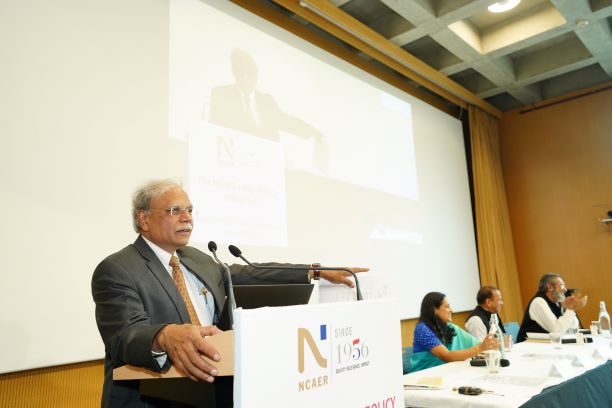 The N-LRSI is an integral part of the NCAER Land Policy Initiative (NLPI) launched in 2019 with the aim of filling the gaps in economic research, policy analysis, and systematic data on land. Access to land is a critical factor for economic growth and poverty reduction. For government, industry, and citizens to be able to use this asset effectively and to minimise disputes, it is important to have access to reliable land and property records. Over the years, different states have made significant progress in making their land records digitally available to citizens. The N-LRSI aims to understand the extent of this progress and existing gaps and to identify measures to improve land records in each state.
The N-LRSI is an integral part of the NCAER Land Policy Initiative (NLPI) launched in 2019 with the aim of filling the gaps in economic research, policy analysis, and systematic data on land. Access to land is a critical factor for economic growth and poverty reduction. For government, industry, and citizens to be able to use this asset effectively and to minimise disputes, it is important to have access to reliable land and property records. Over the years, different states have made significant progress in making their land records digitally available to citizens. The N-LRSI aims to understand the extent of this progress and existing gaps and to identify measures to improve land records in each state.
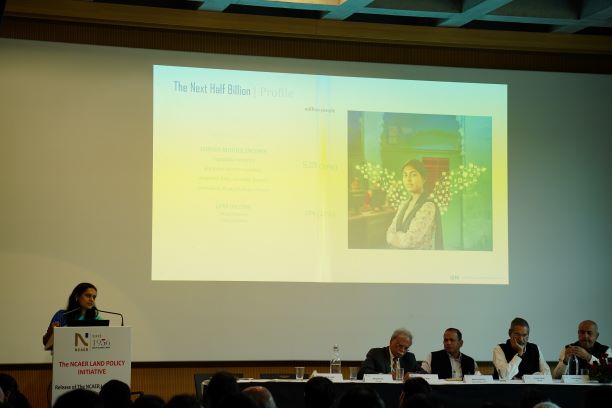 The 2020 N-LRSI is based on data collected over 2019-20 on two aspects of the supply of land records—the extent of digitisation of land records and the quality of these land records. The first component, which aims to assess whether a state has made all its land records digitally available to citizens, looks at three dimensions—the text of the land records (also called the record of rights), the official map associated with a land record (also called cadastral maps), and the property registration process.
The 2020 N-LRSI is based on data collected over 2019-20 on two aspects of the supply of land records—the extent of digitisation of land records and the quality of these land records. The first component, which aims to assess whether a state has made all its land records digitally available to citizens, looks at three dimensions—the text of the land records (also called the record of rights), the official map associated with a land record (also called cadastral maps), and the property registration process.
The second component of the Index aims to assess if the land records are comprehensive and reliable–are ownership details updated as soon as a sale occurs, the extent of joint ownership, type of land use, land area on the record and on the map, and are encumbrances being recorded (other claims on the property such as mortgages and court cases). All these elements are closely connected to land disputes and to the ease with which transactions in land can be completed and legally recorded and then conveniently accessed.
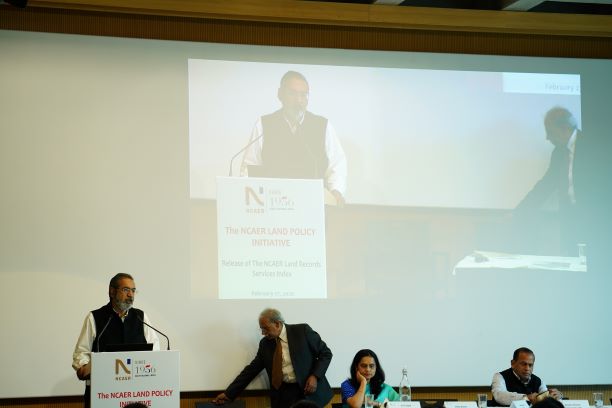 While delivering his keynote remarks at the launch of N-LRSI 2020, Mr Ramesh Abhishek, former Secretary, Department for Promotion of Industry and Internal Trade, lauded NCAER’s perceptive and insightful study on land record management in India. He said, “The N-LRSI is an excellent Reality Check on the status of land records and their accessibility in various states. This brings out the strengths and area of improvement for the government agencies and makes very practical recommendations on way forward. Central and State Governments should pay utmost attention to the findings of the Index and tailor their policies and programme accordingly.”
While delivering his keynote remarks at the launch of N-LRSI 2020, Mr Ramesh Abhishek, former Secretary, Department for Promotion of Industry and Internal Trade, lauded NCAER’s perceptive and insightful study on land record management in India. He said, “The N-LRSI is an excellent Reality Check on the status of land records and their accessibility in various states. This brings out the strengths and area of improvement for the government agencies and makes very practical recommendations on way forward. Central and State Governments should pay utmost attention to the findings of the Index and tailor their policies and programme accordingly.”
In his introductory remarks, Dr Shekhar Shah, Director General, NCAER, noted that “The N-LRSI is timely, pioneering work and is already attracting policymaker attention at the Central and State levels. The Index can serve at least three purposes. First, it will help formulate State action plans to attain the goal of secure, assured land records that mirror ground realities and are generated by efficient titling services. Second, the N-LRSI’s comparative assessment of States and UTs will make it possible for the States to learn from each other, with the best performing States showing how the supply of good, reliable, accessible digital land records has been improved. Third, the Central Government can use the N-LRSI to reward and recognise States and UTs that perform better on the Index so that the others are encouraged to improve their standing.”
While introducing N-LRSI 2020, the project co-leader Mr Deepak Sanan, former Additional Chief Secretary (Revenue), Government of Himachal Pradesh and now NCAER Senior Advisor, observed that “the N-LRSI 2020 could not have come at a more opportune moment. The Indian economy has slowed down dramatically over 2018 and 2019. Lack of improvements in the ability to acquire and hold land, and use and transact in land and property, are major impediments inhibiting both investment and poverty reduction. India’s spectacular improvement on the World Bank’s Ease of Doing Business index stands in marked contrast to the dismal showing with regard to the component of the Index that relates to land, the ease of registering property.”
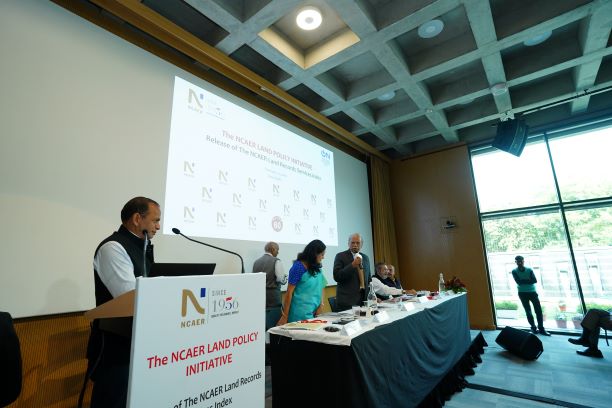 NCAER is part of the Property Rights Research Consortium, a multi-institution research consortium supported by generous grants from the Omidyar Network India. The Property Rights Research Consortium is focusing on building research and evidence on the rights to land, housing and other assets. The National Institution for Public Finance and Policy, the Centre for Policy Research’s Land Rights Initiative, and Brookings India are currently the other members of this network.
NCAER is part of the Property Rights Research Consortium, a multi-institution research consortium supported by generous grants from the Omidyar Network India. The Property Rights Research Consortium is focusing on building research and evidence on the rights to land, housing and other assets. The National Institution for Public Finance and Policy, the Centre for Policy Research’s Land Rights Initiative, and Brookings India are currently the other members of this network.
Speaking on why indices and research such as the N-LRSI is important, Ms Shilpa Kumar, Investment Partner, Omidyar Network India, said, “Our goal is to help leading policy organizations bring sharper focus on property and land rights, an area that is relatively under researched but very vital for individual and societal wellbeing. Given that land and housing account for nearly 77 per cent of household assets in India, we hope that research like this can better inform more effective policy making.”
Talking about the next steps for the N-LRSI, project co-leader Professor Devendra B Gupta said, “The first round construction of the N-LRSI primarily used supply-side data during 2019-20, including proxies for measuring access for citizens, for assessing the extent of digitisation and gauging the quality of land-records services offered. For the second round using data for 2020-21, a demand-side survey of citizens will be added to gauge the level of public awareness and satisfaction in using digital land records and associated services.”
Besides its launch today at NCAER, the N-LRSI will be featured at the upcoming 4th India Land and Development Conference 2020 (ILDC 2020) in New Delhi during March 2-4, 2020 in which the top performing states will be recognised and their performance will be discussed as a learning tool.
A previous NCAER study that focussed on assessing the extent of computerization of land records and the registration process as well as gauging the extent to which land records reflected the situation on the ground in three Indian States is available here.
N-LRSI 2020 Findings
Scoring 60-75 points, Madhya Pradesh, Odisha, Maharashtra, Chhattisgarh, and Tamil Nadu are the five best-performing States on the N-LRSI. West Bengal, Jharkhand, Rajasthan, Telangana, Andhra Pradesh, and Uttar Pradesh are the six States in the 50-60 point category.
Figure 1 shows the different components of the N-LRSI and their weights and method of evaluation.
Figure 1: Structure of the N-LRSI
.jpg)
Figure 2: N-LRSI 2020 State Rankings
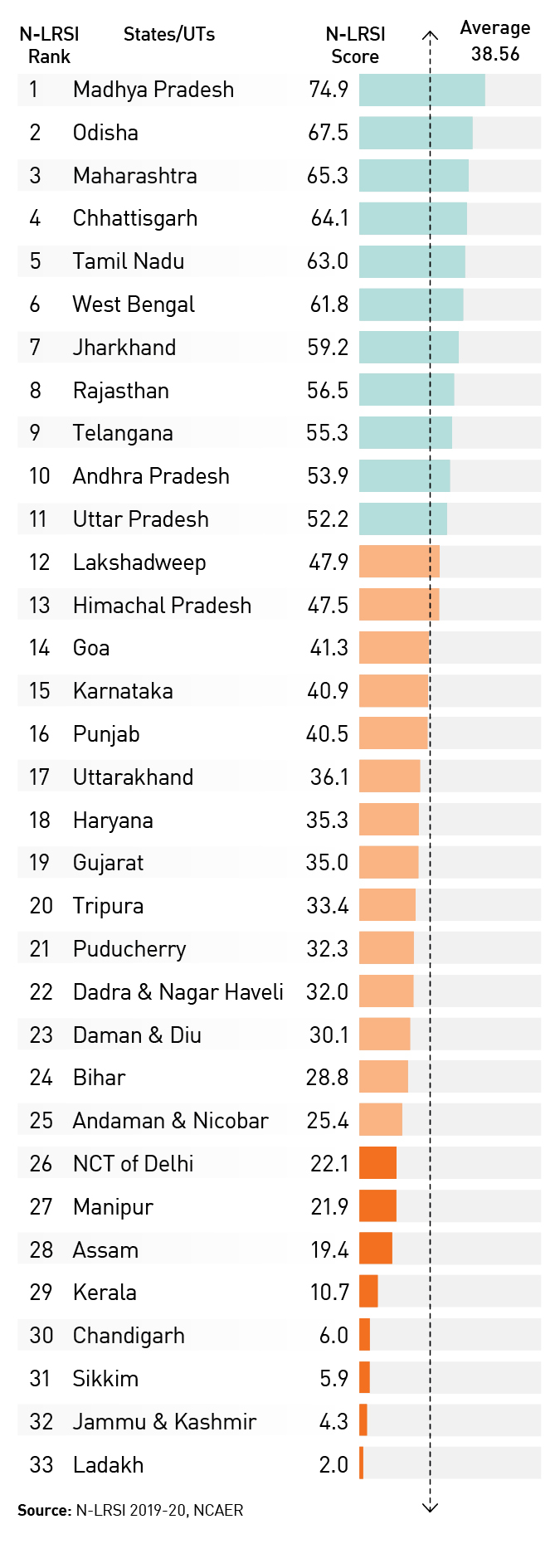






 The N-LRSI is an integral part of the NCAER Land Policy Initiative (NLPI) launched in 2019 with the aim of filling the gaps in economic research, policy analysis, and systematic data on land. Access to land is a critical factor for economic growth and poverty reduction. For government, industry, and citizens to be able to use this asset effectively and to minimise disputes, it is important to have access to reliable land and property records. Over the years, different states have made significant progress in making their land records digitally available to citizens. The N-LRSI aims to understand the extent of this progress and existing gaps and to identify measures to improve land records in each state.
The N-LRSI is an integral part of the NCAER Land Policy Initiative (NLPI) launched in 2019 with the aim of filling the gaps in economic research, policy analysis, and systematic data on land. Access to land is a critical factor for economic growth and poverty reduction. For government, industry, and citizens to be able to use this asset effectively and to minimise disputes, it is important to have access to reliable land and property records. Over the years, different states have made significant progress in making their land records digitally available to citizens. The N-LRSI aims to understand the extent of this progress and existing gaps and to identify measures to improve land records in each state. The 2020 N-LRSI is based on data collected over 2019-20 on two aspects of the supply of land records—the extent of digitisation of land records and the quality of these land records. The first component, which aims to assess whether a state has made all its land records digitally available to citizens, looks at three dimensions—the text of the land records (also called the record of rights), the official map associated with a land record (also called cadastral maps), and the property registration process.
The 2020 N-LRSI is based on data collected over 2019-20 on two aspects of the supply of land records—the extent of digitisation of land records and the quality of these land records. The first component, which aims to assess whether a state has made all its land records digitally available to citizens, looks at three dimensions—the text of the land records (also called the record of rights), the official map associated with a land record (also called cadastral maps), and the property registration process. While delivering his keynote remarks at the launch of N-LRSI 2020, Mr Ramesh Abhishek, former Secretary, Department for Promotion of Industry and Internal Trade, lauded NCAER’s perceptive and insightful study on land record management in India. He said, “The N-LRSI is an excellent Reality Check on the status of land records and their accessibility in various states. This brings out the strengths and area of improvement for the government agencies and makes very practical recommendations on way forward. Central and State Governments should pay utmost attention to the findings of the Index and tailor their policies and programme accordingly.”
While delivering his keynote remarks at the launch of N-LRSI 2020, Mr Ramesh Abhishek, former Secretary, Department for Promotion of Industry and Internal Trade, lauded NCAER’s perceptive and insightful study on land record management in India. He said, “The N-LRSI is an excellent Reality Check on the status of land records and their accessibility in various states. This brings out the strengths and area of improvement for the government agencies and makes very practical recommendations on way forward. Central and State Governments should pay utmost attention to the findings of the Index and tailor their policies and programme accordingly.” NCAER is part of the Property Rights Research Consortium, a multi-institution research consortium supported by generous grants from the Omidyar Network India. The Property Rights Research Consortium is focusing on building research and evidence on the rights to land, housing and other assets. The National Institution for Public Finance and Policy, the Centre for Policy Research’s Land Rights Initiative, and Brookings India are currently the other members of this network.
NCAER is part of the Property Rights Research Consortium, a multi-institution research consortium supported by generous grants from the Omidyar Network India. The Property Rights Research Consortium is focusing on building research and evidence on the rights to land, housing and other assets. The National Institution for Public Finance and Policy, the Centre for Policy Research’s Land Rights Initiative, and Brookings India are currently the other members of this network..jpg)







